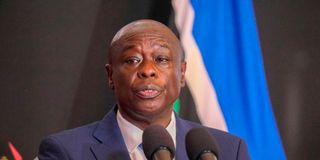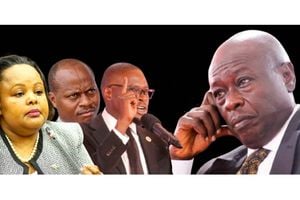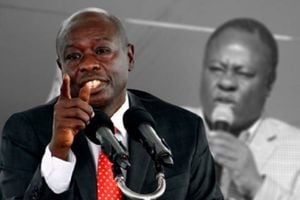
Deputy President Rigathi Gachagua addresses the media at his official resident in Karen, Nairobi on October 7, 2024.
Deputy President (DP) Rigathi Gachagua has accused President William Ruto's administration of State-sponsored abductions and extra-judicial killings, that they had vowed would never be sanctioned.
The DP expressed discontent with the Kenya Kwanza regime, which he is part of, in his defence against an ouster motion in parliament, indicating serious rifts within the government.
On Monday night, Mr Gachagua tore into the Kenya Kwanza administration, citing a return of “abductions and extra-judicial killings.”
“Despite the police misleading the president to say that there are no abductions, you all know, you have evidence on video and that’s what I commented on and said it is wrong.
“Because I’m a truthful person, I’ll say what is wrong when it happens and even though I am compelled by the principle of collective responsibility to be part and parcel of every decision made by the government, I’ll continue to do so only those decisions that are constitutional and within the rule of law,” the DP vowed.
Abductions and extra-judicial killings, he said, were unconstitutional, and “I will never support them.”
President Ruto has consistently insisted there were no abductions despite recorded public cases of the kidnappings.
The DP brazenly told MPs to stop focusing on the frivolous charges against him in the special motion by Kibwezi West MP, Mwengi Mutuse and asked them to focus on the corruption scandals that he said have bedeviled the government.
The country's second in command was bullish during a news conference at his Karen residence in Nairobi ahead of his hearing proceedings in the National Assembly, even attacking the Speakers of the two Houses - Moses Wetang'ula (National Assembly) and Amason Kingi (Senate), whom he faulted for being part of the government's shareholding scheme.
"They accuse me of being divisive and tribalistic when I talk about shares yet I have only advanced the contents of their pre-election agreement they signed with the president, which had been kept secret," Mr Gachagua charged.
He accused Mr Wetang'ula and Prime Cabinet Secretary, Musalia Mudavadi, of only prioritising issues of their Western backyard at the expense of other parts of the country, while faulting Mr Kingi for negotiating to become Senate speaker at the cost of the Coastal region where he comes from.
He also did not have kind words for opposition chief Raila Odinga, whom he said had also entered the government's shareholding scheme.
He was referring to the formation of the broad-based government, which has co-opted former ODM leaders into the cabinet.
They include former ODM deputy party leaders Hassan Joho and Wycliffe Oparanya, ex-national chairman John Mbadi, former Director of Political Affairs Opiyo Wandayi, and former elections board member Beatrice Askul.
During the three-hour interview devoid of questions from the media, the DP also denied allegations of attacking and undermining the work of the National Intelligence Service (NIS) and its officers in the impeachment motion against him, citing that he was only offering positive criticism that he learnt from his boss.
The DP had in June criticised NIS Director General, Noordin Haji, over massive anti-government protests in the country, faulting his office for failing to offer advice to the Head of State that would have prevented the chaos and avoided deaths.
The move is now part of the charges of gross misconduct that Kibwezi West MP Mwengi Mutuse has listed in his motion as forming the basis for Mr Gachagua’s impeachment.
The DP reiterated that NIS ought to have taken responsibility for the failure to arrest the June chaos in the country.
“NIS holds a very critical role in ensuring the safety and security of our country. They are responsible for gathering intelligence and sharing it with all our law enforcement agencies to ensure the country is safe at all times.
“Consequently, when the country was caught flat-footed with regard to the scope and extent of public dissatisfaction with the Finance Bill 2024, which degenerated in the Gen Z protests, it pointed to the failure of the NIS in carrying out its mandate,” the DP said.
He pointed out that he was persuaded that NIS ought to have known beforehand that the public was completely opposed to the Finance Bill 2024 and briefed the president before the protests began.
This, the DP noted, could have caused a change of tact by the government regarding the proposed bill, and protests that culminated in the loss of innocent lives and destruction of property could have been avoided.
“Hence, I expressed my opinion in my public media briefing in Mombasa and my utterances were not any different from what happens to other countries when there is lapse or failure by intelligence agencies,” he said.
He said that his actions were no different from what transpired in the United States during a terrorist attack on September 11, 2001.
“Many of you will recall that after the September 11th, terrorist attack in the US, US intelligence agencies were massively criticized and an inquiry was even opened to inquire why an intelligence agency was not able to detect and thwart the terror attack.
“Under the Constitution of Kenya, the government agencies are supposed to be accountable to the Kenyan people, including the NIS, and calling them out when there is a dereliction of duty does not amount to undermining them,” Mr Gachagua said.
In any case, he went on, the Director General of NIS is not above the law, he is a public officer just like the president, the deputy president, and cabinet ministers and he top is subject to criticism like any other public officer.
“President William Ruto at one time when he was DP criticized the then Director of Intelligence service. In another video, he heavily criticized the then Inspector General of police for underperformance. So I have learnt from my boss how this job is done,” he said.
He said that he and the president are criticised daily but have taken no offence.
“The director of NIS is not above the law, he is a public officer accountable to the people of Kenya. So, if there is a feeling that he has underperformed he will be called out because that is the nature of the Kenyan state. This I learnt from my boss when he was the deputy president,” the DP added.
He said that despite being the deputy president, he enjoys constitutional rights in the Bill of Rights on the freedom of speech.
“So, if the Director General was aggrieved, there are mechanisms of how he can take me to court and sue me for defamation and I will be able to argue why I said what I said.
“So, that’s not a ground for impeachment but curtailing liberties and freedom of expression to hold public officers accountable for their actions,” added Mr Gachagua.









